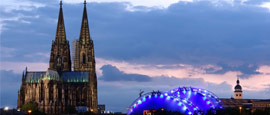Cologne History
That Cologne reinvented itself after being bombed to near oblivion in WWII is a huge testament to the resilience of the human spirit.
Yet the history of Cologne extends further back than the dark days of the 20th century of course. The city began life as a Roman colony (hence its name) and was a key strategic site.
Catholicism flourished in this part of the Roman Empire and in 1248 construction began on a mighty cathedral worthy of housing the relics of the Three Kings themselves.
Work continued up to 1473 and yet still the Dom wasn’t done. Nevertheless, it was the world's tallest building, attracting pilgrims from all over Europe.
Work picked up again in the 19th century and the completion date is largely regarded as being 1880.
Yet a lot had happened to Cologne during that time, most conspicuously the frequent skirmishes with the French.
Following the French Revolutionary Wars, Cologne came under French control. The University of Cologne was closed and all local residents were granted French citizenship.
Perhaps most notably, the French administration scrawled 4711 across the doorway to the Eau de Cologne household and inadvertently went on to launch an international brand.
After the French came the Prussians, and following defeat in WWI, the British moved in for a while. Wartime fortifications were converted into green belts (Grüngürtel) and the University of Cologne was opened anew in 1919.
By the end of WWII, Cologne was swept up into West Germany and began to thrive. The Old Town was repaired along with many Romanesque churches.
Recently, Cologne has been making its name in the media game, founding an Academy of Media Arts, an International Film School and a Media Park over the last few decades.
Excellent transport links have made the city one of the easiest places to access in western Germany.
Did you know?
• Almost 90% of the Old Town was destroyed during WWII.
• Launched in 1967, Art Cologne was the first international art fair of its kind.
• Five FIFA World Cup matches were played at Cologne’s RheinEnergieStadion in 2006.
Do you have any Feedback about this page?
© 2025 Columbus Travel Media Ltd. All rights reserved. No part of this site may be reproduced without our written permission, click here for information on Columbus Content Solutions.




 You know where
You know where